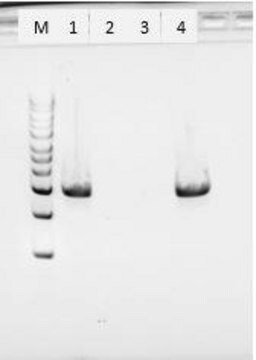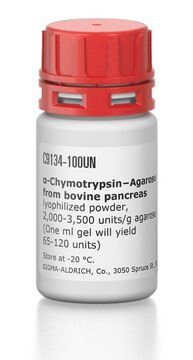P9290
Proteinase K–Agarose from Tritirachium album
lyophilized powder
Synonym(s):
Proteinase K-Agarose
About This Item
Recommended Products
biological source
microbial (T.album
T. ALBUM)
form
lyophilized powder
extent of labeling
30-140 units per g solid
technique(s)
DNA extraction: suitable
RNA extraction: suitable
protein extraction: suitable
swelling
1 g swells to ~5 mL
storage temp.
−20°C
Application
Biochem/physiol Actions
Features and Benefits
• Spin column or batch processing possible.
Unit Definition
Physical form
Storage Class
11 - Combustible Solids
wgk_germany
WGK 3
flash_point_f
Not applicable
flash_point_c
Not applicable
Choose from one of the most recent versions:
Certificates of Analysis (COA)
Don't see the Right Version?
If you require a particular version, you can look up a specific certificate by the Lot or Batch number.
Already Own This Product?
Find documentation for the products that you have recently purchased in the Document Library.
Customers Also Viewed
Our team of scientists has experience in all areas of research including Life Science, Material Science, Chemical Synthesis, Chromatography, Analytical and many others.
Contact Technical Service






